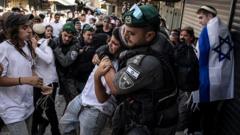In Jerusalem, chaos unfolded as far-right Israeli marchers confronted Palestinians during the yearly Jerusalem Day celebration on Monday. The event commemorates the capture of predominantly Palestinian East Jerusalem during the 1967 Arab-Israeli war, drawing sharp condemnation from various opposition leaders and reports of violence.
The atmosphere was charged as crowds shouted inflammatory slogans like "death to Arabs," while nationalist banners proclaimed sentiments of territorial claims towards Gaza. Opposition Leader Yair Lapid critiqued the event, categorizing it as a “festival of hatred,” and called it an affront to Jewish values.
Israeli police were present in significant numbers at Damascus Gate, a critical area near the walled Old City, attempting to mitigate the violence. Reports indicated harassment of Arab traders in the nearby Muslim Quarter, while right-wing activists called for aggressive measures against perceived threats, including death sentences for "terrorists" from their national security minister, Itamar Ben Gvir.
Critics of the march, including representatives from the Palestinian presidency, voiced alarm over the potential repercussions of the march, linking it to increasing instability in the region. Nabil Abu Rudeineh, a spokesperson for the presidency, emphasized that such provocations exacerbate tensions surrounding historic religious sites, notably the Al-Aqsa mosque compound.
Prominent figures, including left-wing opposition leader Yair Golan, lambasted the scenes of violence, urging for a unified Jerusalem that respects all its inhabitants—Jews, Christians, and Muslims alike. He stated that the actions witnessed were indicative of the destructive impact of hatred and racism.
The annual parade ends at the Western Wall, a central site for Jewish prayers, marking the unification of Jerusalem as proclaimed by the Israeli government as their eternal capital—a claim contested by Palestinians who also seek the city as their future capital.
The backdrop of this year's celebrations is marked by distressing military operations in Gaza, which have resulted in significant casualties on both sides following a Hamas attack on October 7, 2023, leading to a major Israeli military response. Since then, the humanitarian fallout has escalated, with grave losses reported among civilians, prompting urgent calls for peace and dialogue amidst rising tensions.
The atmosphere was charged as crowds shouted inflammatory slogans like "death to Arabs," while nationalist banners proclaimed sentiments of territorial claims towards Gaza. Opposition Leader Yair Lapid critiqued the event, categorizing it as a “festival of hatred,” and called it an affront to Jewish values.
Israeli police were present in significant numbers at Damascus Gate, a critical area near the walled Old City, attempting to mitigate the violence. Reports indicated harassment of Arab traders in the nearby Muslim Quarter, while right-wing activists called for aggressive measures against perceived threats, including death sentences for "terrorists" from their national security minister, Itamar Ben Gvir.
Critics of the march, including representatives from the Palestinian presidency, voiced alarm over the potential repercussions of the march, linking it to increasing instability in the region. Nabil Abu Rudeineh, a spokesperson for the presidency, emphasized that such provocations exacerbate tensions surrounding historic religious sites, notably the Al-Aqsa mosque compound.
Prominent figures, including left-wing opposition leader Yair Golan, lambasted the scenes of violence, urging for a unified Jerusalem that respects all its inhabitants—Jews, Christians, and Muslims alike. He stated that the actions witnessed were indicative of the destructive impact of hatred and racism.
The annual parade ends at the Western Wall, a central site for Jewish prayers, marking the unification of Jerusalem as proclaimed by the Israeli government as their eternal capital—a claim contested by Palestinians who also seek the city as their future capital.
The backdrop of this year's celebrations is marked by distressing military operations in Gaza, which have resulted in significant casualties on both sides following a Hamas attack on October 7, 2023, leading to a major Israeli military response. Since then, the humanitarian fallout has escalated, with grave losses reported among civilians, prompting urgent calls for peace and dialogue amidst rising tensions.


















